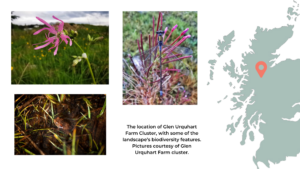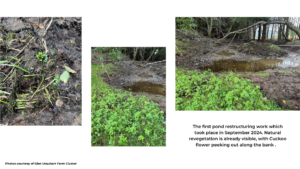
Grants
Restoring ecosystems
Glen Urquhart Farm Cluster
£15,000 awarded
Pond and Wetland Creation in the Glenurquhart Farm Cluster
Grantee: Glen Urquhart Farm Cluster (through Trees for Life)
Duration: September 2024 – September 2025
Background
The Highland farming landscape – which holds 35% of Scotland’s agricultural land – faces several environmental challenges. A variety of factors such as enclosure, overgrazing (by sheep and deer), and wetland draining have resulted in widespread biodiversity loss.
However, several opportunities to restore biodiversity on agricultural land exist. The growing network of farm clusters (eg here and here) across the Highlands, and Scotland as a whole, reflects a desire for bottom-up solutions led by people on the ground. Through collaboration between neighbouring landholders, biodiversity can be monitored and improved at both local and landscape scales.
Introduction to project
The Glenurquhart Farm Cluster is a grassroots group of farmers and crofter aiming to make landscape scale change in Glenurquhart and Strathglass, to the west of Loch Ness. The cluster was formed recently through Trees for Life’s Affric Highland’s partnership (who provide ongoing support), with additional guidance from nearby West Loch Ness Farm Cluster (more here).

Having completed a Biodiversity Action Plan and identified key areas to work on, this project focuses on ponds and wetlands, aiming to increase the range of habitats in the Glen. By slowing down water flow, the project simultaneously acts as a nature based solution to local flooding, which has become a significant issue in recent years.
Activities involve constructing new ponds and wetlands and restoring existing ones across five farms and crofts. Working with a local ecologist and contractor, diggers will create ponds with complex topography in order to maximise habitat diversity and cater for a range of species. Monitoring will take place through photography and species surveys to evaluate the impact of the work.
Not only will the work have an immediate ecological impact locally; results will be shared with residents, rewilding networks, and the wider farming community.

